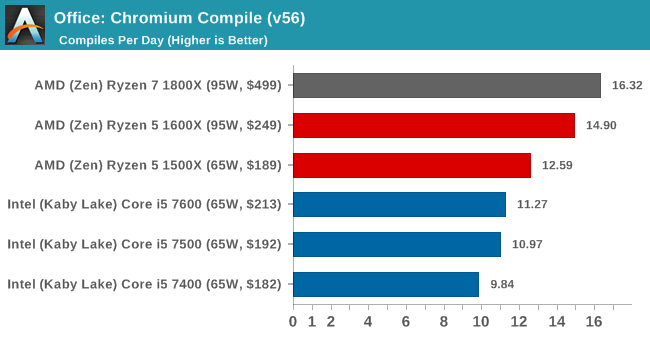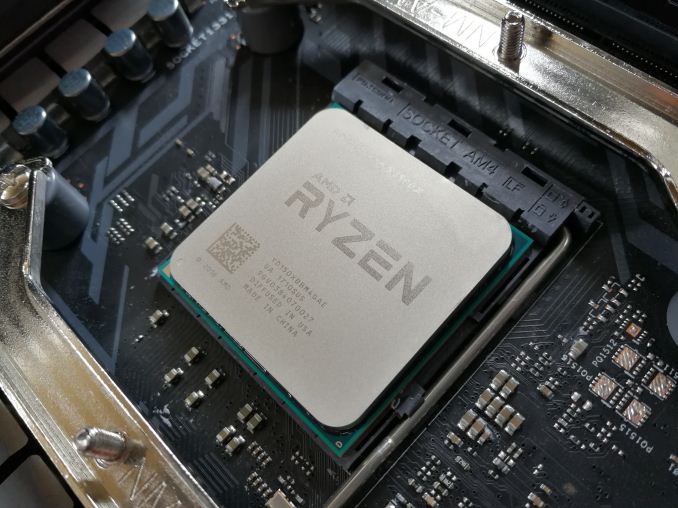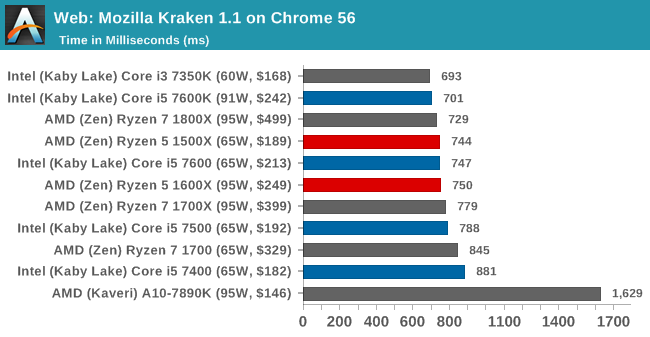The AMD Ryzen 5 1600X vs Core i5 Review: Twelve Threads vs Four at $250
by Ian Cutress on April 11, 2017 9:00 AM ESTAMD Ryzen 5
We mentioned at the top of the review that AMD’s Ryzen 7 launch last month benefited in a market where the competition was extremely expensive – being able to offer equivalent performance in most tasks and then undercut the competition by 50% is a difficult task, but the opening was always there due to a lack of competition in this space. When it comes to the mainstream market, the Ryzen 5 processors are actually competing on price with Intel’s processors directly, and thus has to offer something more to compete.
We have already shown in previous reviews that the Zen microarchitecture from AMD is around the equivalent of Intel’s Broadwell microarchitecture, but at this lower price point we have AMD’s Zen against Intel’s Kaby Lake, which is two generations newer than Broadwell and affords a comfortable IPC uplift over Broadwell. Given AMD’s monolithic design strategy of a single silicon die catering for most of their product line (well, all of it so far), the way AMD is tackling this is through more cores.
Before the debate about cores from AMD’s past rears its head (Vishera/Bulldozer designs in that case), given that AMD’s single thread performance is not too far behind, having a big set of cores as an alternative is something interesting for end-users, especially as more work flows and gaming titles rely on multithreading to scale. As a result, where Intel offer four cores and four threads, AMD is now offering six cores and twelve threads – a potential +200% uptick in the number of threads and +50% in cores, albeit at 10-15% lower instructions per clock.
(There’s also a side argument here about die sizes and wafer costs to each company to consider, but we will leave that for a different piece.)
For this review, based on time and available parts, we tested the Ryzen 5 1600X six-core processor against a set of Intel Core i5 parts that users might also be considering. We have some Ryzen 5 1500X quad-core numbers in here as well, and that might be spun out into a separate review at a later date. We also demonstrated our new 2017 CPU gaming tests, with four GPUs, six tests, two resolutions per test, and a couple of extra extreme resolution tests.
On The Benchmark Results
Looking at the results, it’s hard to notice the effect that 12 threads has on multithreaded CPU tests. The usual culprits show big wins for AMD here: 2D to 3D photo conversion, ray tracing, Blender, Cinebench, Encryption and video transcoding are all sizable wins. This is the sort of workload in which moving up to the Ryzen 7 CPUs, budget permitting, also do well on.
A new test in our suite for this review is a Compile Chromium test on Windows. As part of our testing suite, we have a fixed nightly download from mid-March and set this to compile, taking the final time and converting it into how many compiles per day. For around $250, Ryzen is the only way to go:

As you would expect, AMD still lags in IPC to Intel, so a 4.0 GHz AMD chip can somewhat compete in single threaded tests when the Intel CPU is around 3.5-3.6 GHz, and the single thread web tests/Cinebench results show that.
On The Gaming
Our gaming tests are a mix of Full-HD and 4K testing, some of which ends up being more CPU limited than we expected.
Civilization, at both 1080p and 4K Ultra settings, seem to scale quite happily with more cores on all GPUs, except the GTX 1060 at 4K. It’s worth noting situations such as the R9 Fury at 1080p Ultra only has 920ms under 60 FPS on the 1600X, compared to 6300 milliseconds on the Core i5-7600.
Shadow of Mordor leans towards the higher IPC of Intel, as the DX11 title cannot take advantage of the cores as much. Rise of the Tomb Raider’s benchmark is notorious for having each of its three seconds perform differently with respect to CPU scaling, with the Prophets scene being more CPU limited than the rest of the stage in the game.
Rocket League using an AMD CPU + AMD GPU actually provides more equal results with NVIDIA GPUs, however there's a performance drop using Ryzen + NVIDIA, which potentially correlates towards a driver bug but we're not 100% sure what is going on. Grand Theft Auto is a mixed bag, despite being a DX11 title – in some situations the Ryzen 5 is ahead of the Intel CPUs, or they all perform about the same, or the Intel CPUs pull ahead.
I have $250, What Should I Get – the Core i5 7600/7600K or the Ryzen 5 1600X?
Platform wise, the Intel side can offer more features on Z270 over AM4, however AMD would point to the lower platform cost of B350 that could be invested elsewhere in a system.
On performance, for anyone wanting to do intense CPU work, the Ryzen gets a nod here. Twelve threads are hard to miss at this price point. For more punchy work, you need a high frequency i5 to take advantage of the IPC differences that Intel has.
For gaming, our DX12 titles show a plus for AMD in any CPU limited scenario, such as Civilization or Rise of the Tomb Raider in certain scenes. For e-Sports, and most games based on DX9 or DX11, the Intel CPU is still a win here.












254 Comments
View All Comments
bodonnell - Wednesday, April 12, 2017 - link
Good luck with that. Since Microsoft is only supporting Kaby Lake and Ryzen on Windows 10 I guess you'll be sticking with 2015 and older technology for a while. I bet you desperately hung onto Windows XP too..._zenith - Thursday, April 13, 2017 - link
... except for the fact that many games are console ports now, aaaaannd those are often - usually - already written for DX12, and this will only become moreso once Xbox Scorpio is released, with it's special DX12 hardware optimisations.Notmyusualid - Tuesday, April 18, 2017 - link
@zenithGo ahead and release a DX12-only game.
Let me know how you get on with sales...
Arbie - Wednesday, April 12, 2017 - link
When I do upgrade it will be with AMD. Even where (and if) Intel offers a little more performance per dollar, AMD has amazingly reduced the difference to the point where I can accept it in order to help fuel competition. If the market does not reward AMD for their valiant effort in Zen, the company may be forced to give up. It seems impossible for them to come from behind yet again in such a high-stakes arena. Then Intel will really slack off, and several years from now we'll ALL be worse off than if they were still duking it out.Everyone has to make their own decision, and I couldn't buy the Excavator etc fiascos, but the AMD product is now a real contender - and we need to keep them there.
bodonnell - Wednesday, April 12, 2017 - link
Agreed. I updated my main rig a couple years ago and Intel was really the only option at the time, but if I was in the market now I would definitely be looking at a Ryzen 5 as keeping AMD around is better for consumers. For the money where Ryzen 5 lags it doesn't lag by much (and honestly legacy software that is single threaded was made to work on much lower performance cores) and where it shines (multi-threaded performance) it often beats price comparable Intel processors by a healthy margin.BrokenCrayons - Wednesday, April 12, 2017 - link
Ryzen 5 is an interesting CPU, worth a careful look given the outcome of the benchmarks in this article. Modern workloads seem to be much more likely to use more than one thread and legacy workloads that are single threaded would perform perfectly well on just about any modern CPU so it really isn't a difficult choice to look into a Ryzen 5 if you fall into its price bracket. AMD's APU offerings in the future might offer a better value for some customers since the price of a Ryzen CPU doesn't currently include graphics. People happy with iGPU performance would either require a dedicated graphics card purchase or reuse one thy already have available to build a complete system around a Zen-based processor so those sorts might be better off waiting until the APU versions are released later this year or they might be compelled to purchase a competing Intel product with an iGPU.bodonnell - Wednesday, April 12, 2017 - link
Can't wait to see what AMD does with the Zen core in the mainstream and mobile markets. A well balanced quad core design with a good Polaris based iGPU will be all most consumers need for their day to day use.OddFriendship8989 - Wednesday, April 12, 2017 - link
Is there a reason you don't put in the 7700k in these charts? I mean if you're going to put in 1700X and 1800X, you should put in 7700k too. Plus at just $80 more it's honestly a CPU being considered too people consider the 1600X.vladx - Wednesday, April 12, 2017 - link
Reason is obvious, anandTech have an AMD bias.Outlander_04 - Thursday, April 13, 2017 - link
Unlike yourself, and your well respected neutrality ?